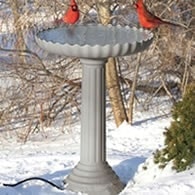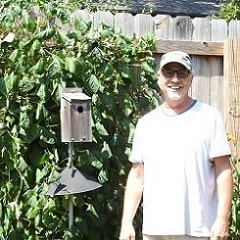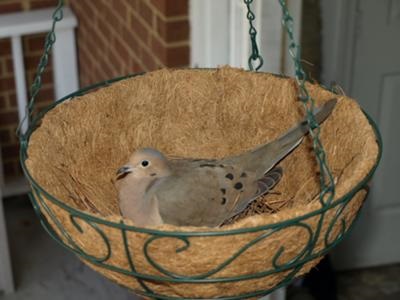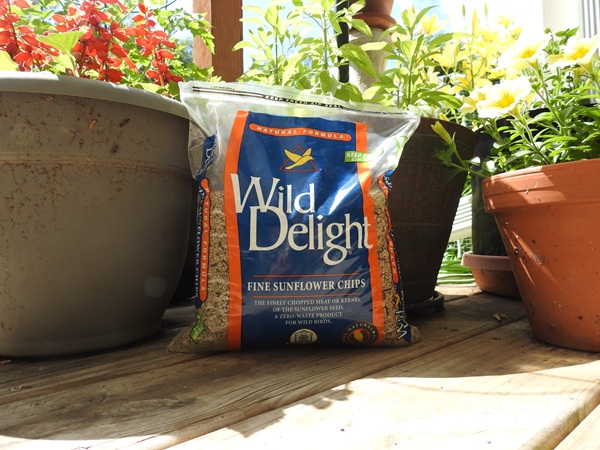Eastern Gray Squirrel: Breeding Season, Nesting, Territory, and Habits
In this guide we'll discuss their breeding season, nesting habits, territory, and more.
What They Look Like Description

Eastern Gray Squirrels are 17 to 20 inches long. They have grayish-brown fur, except for their bellies which have pale fur.
The tail often has silvery-tipped hairs at the end.
In Canada, some have rufous bellies and tails. Black phase is common in northern parts of its range.
Mating, Breeding Season, and Gestation Habits
During the breeding season which happens twice a year. First breeding is done December to January. The second will be in late May to July.
The female gives off a scent that attracts males. A line of males can be seen chasing one female.
While this chase may seem like the female is trying to get away its really a test of the agility of the male.
The male that keeps up with her shows that he has strong genitics to pass on.
The ones immediately behind her in the chase are the most dominant males and one will likely mate with her.
Their home or nest is a leafy nest located in a cavity or fork of a tree.
Do Gray Squirrels Mate For Life?
The Female Eastern Gray chooses a male for each liter she has. The males do not help in raising or the feeding of the young.
Males will breed with multiple females during each breeding season, but neither mate for life.
Nesting Habits: Building Homes

Cavities suitable for squirrel nests occur most often in older trees, particularly white oaks, elms, sycamores and soft maples.
These are preferred home sites especially for winter and for nurseries, because they provide good protection from weather and enemies.
Leaf nests are usually built in the tops of large trees and consist of a rough twig framework with a bulky pile of leaves heaped layer upon layer.
| Eastern Gray Squirrel Nesting Stats | |
|---|---|
| Number of Young | 2-3 common - up to 8 possible |
| Length of Gestation | 45 days |
| Young Leave Nest | 6 - 7 weeks independent 7 - 8 weeks |
| Number of Liters | 2 per year |
The squirrel hollows out a nest cavity in the center of the leaves and lines it with softer materials.
Gray squirrels gestation (pregnant isn't the term used) requires about 45 days and one to eight young comprise a litter, but two or three are most common.
The young are hairless at birth, have their eyes and ears closed, and possess well developed claws.
They come out of the nest for the first time when 6 to 7 weeks old. Within another week or so they will be weaned.
Feeding Habits What They Eat
In summer, you will notice that Eastern Gray squirrels are most active at your feeders in the early morning and again in mid-afternoon.
During the middle of the day they rest in trees out of the sun.
In the winter when the days are shorter, noontime is their peak activity time.
The primary natural foods include; nuts, fruits and buds of hickory, pecan, walnut, elm, mulberry, and field corn.
The least expensive way to feed them in winter is to offer cracked corn on ground level platform feeder.
To bury a nut, a gray squirrel digs a hole about 3 to 4 inches deep, puts the nut inside the hole then, pushes it down whit its nose and pulls the soil over it with its front paws.
When it wants to retrieve the nut, it goes to the general area and locates it either by the smell of the nut or by the squirrels own scent left when burying the food.
Territory

The range of the Eastern Gray squirrel consist of several acres that overlap the home territories of other squirrels. Although they seldom travel farther than 200 yards from home in any one season.
They do not defend these territories. However, there is a dominance hierachy with others of the same species.
In general, older males are dominant over females and younger squirrels.
The one exception to defense of territory is that the female will protect the area around any liter she is raising.

Quick Fun Facts
Lifespan of the Eastern Gray Squirrel in the wild averages 6 years.
They can locate buried food covered with a foot of snow by sense of smell and memory.
Most active a couple of hours after sunrise and anywhere from two or five hours before sunset. The rest of their time is spent in their den or on a branch.
Eastern Gray Squirrels may be white, gray, or black. Differences may be in the same liter.
They can jump about 5 feet straight up and 7 feet from branch to branch in trees.
Predators - What Eats Them
Bird predators include: Red-tailed Hawks, Northern Goshawks, Cooper's Hawk, Barred Owl, and Great-horned owls.
Other predators include cats and dogs and in the nest, snakes and raccoons. Many are struck by automobiles each year.
wild-bird-watching.com participates in Amazon.com associates program. As such, we earn commisions from qualifying sales at no additional cost to you. See our Privacy Policy Here
Related Reading:

|

|

|

|
| Readers Digest Guide | Golden Guide | Your State Only | Nat-Geo Guide |







